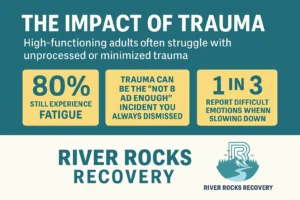When “Doing Fine” Becomes Its Own Trap
I didn’t think I needed therapy. I wasn’t falling apart. I wasn’t out of work or losing relationships. I paid my bills, met my deadlines, showed up for people. If you asked how I was doing, I’d tell you: “I’m fine.”
But fine was a lie.
Fine meant headaches every morning and wine every night. It meant scrolling in silence at 2am, too wired to sleep, too numb to cry. Fine meant holding everything together so tightly I didn’t even notice my jaw was clenched all day.
The idea of slowing down—of feeling something—felt dangerous.
That’s why when a therapist suggested I try EMDR Therapy, my first reaction wasn’t hope. It was fear.
The Silent Burnout of High-Functioning Trauma
Not everyone who needs help looks like they’re struggling.
Some of us are excellent performers. We overdeliver at work. We’re the glue of our families. We keep secrets better than most. We smile in the pictures and collapse in private.
But beneath the surface is something simmering:
- Trauma we never had time to process
- Grief we minimized so others wouldn’t feel uncomfortable
- Patterns we built to cope that eventually became cages
I didn’t call it trauma for a long time. I just thought I was tired. Or anxious. Or “not the type of person who gets therapy.”
But what I was really doing was avoiding stillness.
Why Slowing Down Can Feel Unsafe
Here’s the truth: when you spend your life surviving, slowing down doesn’t feel relaxing. It feels dangerous.
Stillness makes room for feelings we’ve buried.
Pausing brings up memories we don’t want.
Rest requires trust—and most of us don’t trust easily.
In the absence of motion, what’s left? That question alone kept me moving at all costs.
EMDR Therapy: A Different Way In
EMDR Therapy (Eye Movement Desensitization and Reprocessing) isn’t traditional talk therapy. That’s what made it feel possible for me.
You don’t need to rehash every detail. You don’t have to be “ready to face it all.” EMDR works by gently helping your brain reprocess traumatic memories so they stop triggering the same emotional charge.
It’s not about erasing the past. It’s about removing its grip on the present.
During sessions, your therapist may guide you through eye movements, tapping, or other forms of bilateral stimulation while you recall distressing events. It sounds simple—but the neurological impact is profound.
You stay in control. You don’t have to explain everything. And you’re not alone.

What It Was Like to Start EMDR
At first, it felt weird.
My body didn’t know how to relax. My mind kept scanning for the next thing to fix. But my therapist didn’t push. We worked slowly. Safely. One layer at a time.
I realized that my nervous system was still stuck in fight-or-flight from things that happened years ago. I had moved on—but my body hadn’t.
That’s what EMDR helped with.
It gave my system a way to finally put the file away instead of living like the alarm bell was still ringing.
Trauma Doesn’t Always Look Dramatic
This part matters.
You don’t have to have a “capital-T Trauma” to benefit from EMDR.
Plenty of high-functioning adults carry emotional bruises that never got named.
- The parent who was never really safe
- The time you were bullied but told yourself to get over it
- The loss you never grieved because you had to stay strong for someone else
Trauma isn’t about what happened. It’s about what your body did with it.
If you’re constantly tired, reactive, shut down, or numb—EMDR might help.
You Don’t Have to Break to Deserve Help
One of the hardest beliefs to unlearn was this:
“If I can still function, it’s not that bad.”
But just because you can keep going doesn’t mean you should have to do it like this.
You don’t need to hit bottom to get support.
EMDR helped me realize that survival isn’t the same as healing. That productivity isn’t peace. That staying “fine” was costing me more than I realized.
EMDR Therapy in Middletown, Ohio
If you’re anywhere near Middletown, Ohio, and this is resonating—you don’t have to do this alone.
At River Rocks Recovery, EMDR Therapy is offered in a way that honors your pace, your privacy, and your life. This isn’t about fixing you. You’re not broken. It’s about giving your nervous system the chance to exhale.
And sometimes, that exhale is the first step toward actual freedom. Recovery in West Chester, Hamilton, Monroe & Dayton, starts with support that understands. Explore our servuces and find safe ways to process your memories.
FAQ About EMDR Therapy
What does EMDR Therapy feel like during a session?
Most people describe EMDR as surprisingly calm. You remain fully awake and in control. Your therapist guides you through recalling a difficult memory while using back-and-forth eye movements, taps, or sounds. Over time, the memory becomes less triggering.
Do I have to talk about everything that’s happened to me?
No. One of the benefits of EMDR is that you don’t have to explain every detail. The therapy works by helping your brain reprocess the experience, even if you don’t share the full story aloud.
Is EMDR only for big traumas?
Not at all. EMDR is effective for both “big T” trauma (like abuse or accidents) and “little t” trauma (like neglect, breakups, or ongoing stress). Many high-functioning people benefit from EMDR for stress and anxiety that doesn’t seem to go away.
How long does EMDR take to work?
It varies. Some people experience relief in just a few sessions, while others need longer. What matters is that it moves at your pace. It’s not about rushing—it’s about healing.
Can I still work and live my normal life while doing EMDR?
Yes. EMDR is designed to be integrated into your life. Many people continue working and managing responsibilities while in therapy. Your therapist will help you balance progress with stability.
What Slowing Down Taught Me
Here’s what I know now:
Slowing down doesn’t mean falling apart.
It means giving yourself the room to actually heal.
EMDR helped me stop surviving and start living. Not dramatically. Not all at once. But slowly, steadily, and with less fear.
If you’ve been white-knuckling your way through life, always “fine” but never okay—this might be your sign.
Call (888) 905-6281 or visit EMDR Therapy page to learn more about EMDR Therapy services in Middletown, Ohio. Your strength got you this far. Let us help you feel safe enough to rest.




























